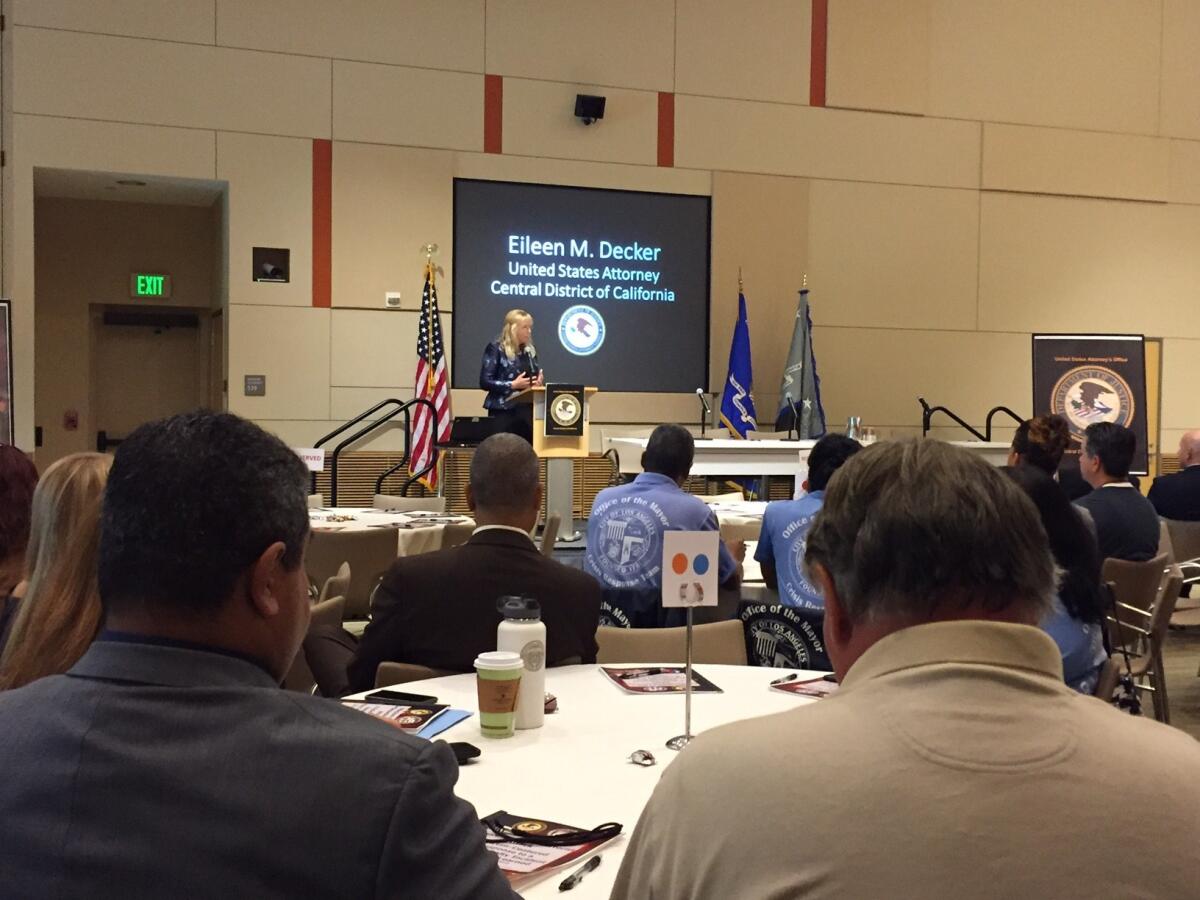First responders use lessons from San Bernardino terrorist attack to better help other victims

- Share via
First responders from various cities attended a conference Tuesday aimed at better serving victims of mass-casualty incidents such as the San Bernardino terror attack.
The one-day event, at the California Endowment Center in downtown Los Angeles, was hosted by the U.S. Department of Justice’s office of legal and victim programs.
The conference focused on the Dec. 2 San Bernardino attack at the Inland Regional Center, which serves people with developmental disabilities in Riverside and San Bernardino counties.
Syed Rizwan Farook and his wife, Tashfeen Malik, burst into the center and shot dozens of people. Fourteen people were killed, and 22 others were injured.
Farook and his wife were killed in a gun battle with police after a car chase.
The San Bernardino shooting had been the deadliest terror attack on U.S. soil since Sept. 11. It was surpassed in June, when 49 people were killed and 53 others were injured after Omar Mateen, a 29-year-old U.S. citizen who reportedly had pledged allegiance to Islamic State, opened fire and took hostages inside Pulse, a gay nightclub in Orlando, Fla.
Eileen M. Decker, U.S. attorney for the central district of California, said the two attacks led to Tuesday’s conference, which was held to help first responders learn how best to assist victims of such incidents.
She said after such attacks, much of the focus is on how law enforcement can prevent future incidents, but it rarely focuses on how to improve the response to victims.
“Today, our goal is learning how we can best develop a victim-centered approach to mass-casualty events like that one in San Bernardino,” she told a room of dozens of first responders from various agencies. “It’s one of the most important ways we can honor the victims and their sacrifice.”
Decker said one of several issues to be discussed is how law enforcement agencies can communicate better with victims and provide information to family members during and after attacks.
“As we learned, even after the initial emergency is over, survivors and the victims have a deeply felt need to know what is happening with the case and what is happening to the investigation, and we owe it to them to provide as much information as possible,” Decker said.
Among those attending were members of the FBI, Homeland Security and the governor’s office of emergency services. Personnel from the cities of Riverside, San Bernardino, South Pasadena and Glendale also attended.
“An effective and passionate approach to protecting and caring for victims helps us and starts repairing the long-term damage these incidents cause,” Decker said. “Attacks like the ones in San Bernardino are so despicable not just but because of the immediate damage they cause, but because they seek to undermine our trust in our institutions and our own peace of mind. That is why a victims-centered approach is so critical.”
For more Southern California news, follow @latvives on Twitter.
ALSO
Full coverage of the San Bernardino terrorist attack
Syria stalemate and Philippine leader’s cursing vex Obama on Asia trip
Dogs, Deepak Chopra, Instagram weddings and other signs of change among Iran’s middle class
More to Read
Sign up for Essential California
The most important California stories and recommendations in your inbox every morning.
You may occasionally receive promotional content from the Los Angeles Times.











